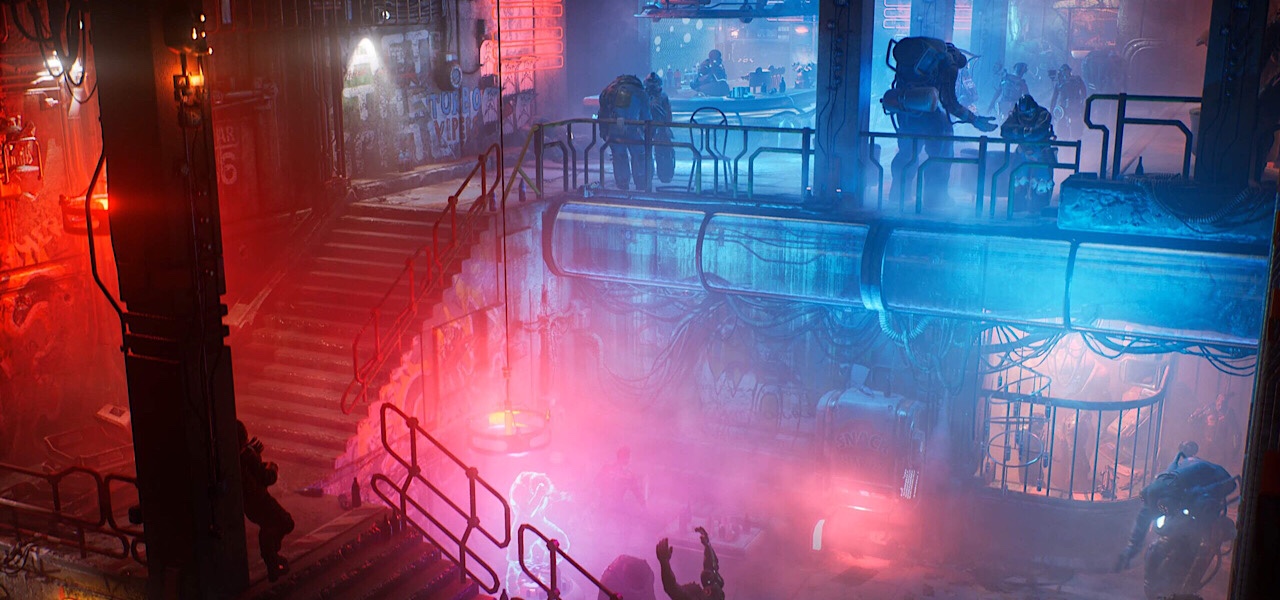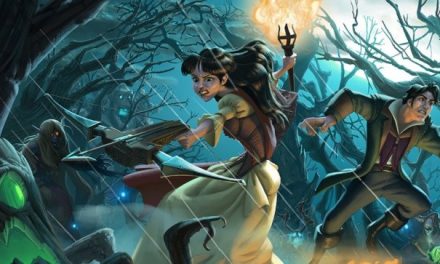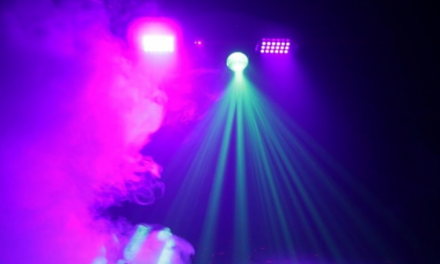Content warning: this story contains difficult and uncomfortable elements from a non-binary person’s upbringing. It is ultimately a character background focused on finding acceptance, but that road is rocky, and painful, and dangerous.
Okea never felt at home in the physical world. Cold, judging eyes were everywhere; cataloguing, categorizing, labeling. Metahumanity, and the electronic systems they had created, dealt much more easily, more readily, with groups than it did individuals. To a casual observer, an ork with red hair was just that and nothing more—merely a list of easy characteristics that ultimately said nothing about the person they described.
Whether growing up on the dirty, industrial streets of Novosibirsk or awash in the neon glow of Osaka’s opulent downtown years later, Okea could always feel the eyes of the world on them. The gilt and AR broadcasts of opulent society did nothing to hide the rotten core beneath—if anything, it made the population even more overt in their judgment, thinking too highly of themselves by double.
While the Matrix always held a special place in their heart, the anonymity of electronic communication bringing a sense of freedom the analog lacked, Okea’s true fascination were drones. Robots didn’t judge or disapprove, they only did what they were told, what they were created to do. Piloting a drone was the closest they ever felt to being true to themselves.
They didn’t cast their lot in with the transhumanists—there was nothing wrong with being human, it was society itself and the people that perpetuated it who were to blame for the state of the world—but much of their propaganda rang true for Okea, even at a young age. When their father found a Techno Republic policlub flyer in their school bag, the relation between the two shifted irrevocably.
A devout attendee of the local Orthodox church, he was furious at them for what he felt was “an insult to our God, to think you know better than Him.” In that instant they had gone from his only child, filled with promise and a bright future, to a heretic whose foolish desires had let let them stray from the one true path.
The beatings and the sermons—at home and in the large town cathedral both—continued for years. They couldn’t help but divulge how out of place they felt around others, how uncomfortable they were with their own developing body. The church was not kind, and the warm and caring father they remembered became a distant memory, only surfacing as a further torment in the midst of already terrible nightmares.
With no support network—no friends or extended family willing to take them in, or even to lend a sympathetic ear—they fled, finally accepting that their life in Siberia was over, perhaps forever. Only by escaping the life they knew would there be the hope of something better, something resembling happiness. Stealing what meager provisions they could, and using their electronic skills to transfer a small amount of their father’s savings—just enough to get by, they did still love the man he once was, after all—Okea disappeared into the darkness, a heavily-bundled form trudging through the midnight snows.
The doctor put down her electronic clipboard and placed a concerned hand on Okea’s arm. “This is an invasive procedure. I know you know that, but I’ll be cutting into and splicing almost every nerve group in your body.” She sighed, absently rubbing the bridge of her nose. “I’ve been around the block long enough to know what it means when someone comes to my small clinic, offers certified credsticks instead of credit or corp scrip for payment, and doesn’t tell me anything about their career. I want to make sure you’re doing this for you, and not just for the hope of making more money on the next job.”
Okea, who had registered at the clinic’s front desk under the name Jarka Orlovi, nodded with grave confidence. “This is for us, and us alone.” They had heard what it would feel like from other accounts, online, but if even half of what they read were true, the surgery would be worth double. “I’m ready.”
The doctor sighed, her lips tight, and she patted Okea’s arm once again. “Sleep well, child.”
As the intravenous anesthetic took sudden hold, they couldn’t even find the strength to protest, that they were nearly twenty-five. As if having jumped off a tall cliffside, dark unconsciousness rushed toward them with the weight of inevitability.
My love for you is as constant as the ocean.
Their father’s voice, the refrain a source of comfort in youth and its later absence, heartache, faded from mind as they swam upwards toward consciousness, his deep timbre replaced by electronic beeping. They tried to move, and began to struggle against the forces holding them down.
“Gentle, gentle,” a stranger said from nearby. “You’ll pull everything out and that won’t do anyone any good.” Their voice was soothing, placating. Okea wasn’t their first patient by a long shot. He unwrapped the gauze which blocked their vision, and encouraged them to look around—carefully.
“How do you feel?”
“I’m…hollow,” was the best they could come up with, ill-equipped to describe the sensation.
“You picked a doozy of an augmentation. Your old ‘jack,” he referenced the small cybernetic port just behind their ear, installed years ago, “is nothing compared to your new control rig. I can’t say that hollow or empty feeling will ever fully go away, but you get used to it, in time.” He smiled distantly, a practiced and routine gesture of sympathy.
They noticed his left arm was synthetic, faux-skin wrapped over cold steel—not a sleek or expensive model. There was a story there, but it had never been in Okea’s character to pry into such things. Instead they simply nodded.
“I’ll go get the doctor,” the nurse said, tapping a menu on his tablet.
Okea always looked serene when controlling a drone, their face at peace and smiling, no matter how strenuous or dangerous the situation. They could be piloting a minuscule fly-spy, surveilling a corporate ballroom or trying to outrun hostile roto-drones, with blood seeping out of their nose from the strain, and still look at home, placid and content.
Teams got used to communicating with them over commlink, as they spent as often as possible with their mind inside a drone or vehicle, to an extent that deckers and mages—who had their own special realms with the Matrix and astral plane, respectively—found their obsession with being jacked in strange and occasionally worrisome.
Okea couldn’t explain how it felt to put their consciousness and perceptions into a machine, any more than they could explain how being fully immersed was the only time they felt truly in sync with themselves. Whether a robotic guard dog or stealth flyer outfitted with electronic countermeasures, the assumed body felt far more real, tangible, and important, than the one they were born with.
The difference between issuing commands to a drone or vehicle using a commlink and diving into virtual reality, where meat and machine moved at the speed of thought, was as great as the difference between VR and using their control rig. It’s not that they simply shifted their mind into the drone, it’s that they became the drone. Its sensors were their perception, its internal circuitry their nervous system. Even when piloting an entire swarm of mini-drones, the control rig—and a great deal of practice—made the experience feel organic, natural, and sublime. Nothing in the physical world could compare.
Okea wasn’t great at socialization, but had a mind as sharp as a whip, and wasn’t too bad with a wrench either, taking great pains to tend to their flock with a care and attention to detail that would put a classic car mechanic’s to shame.
As long as they get to use their drones, and occasionally play with new ones, they’re happy, even though of late there’s been a tiny whisper longing for more consistent social connection than the fly-by-night, solely professional, ephemeral reliance which unites—if temporarily—ad hoc shadowrunning teams. Maybe, just maybe, if they were to find the right group, where they can feel at least a hint of comfort when being social in their physical body, where they are accepted and welcomed not for who they should be but instead who they are, those nagging thoughts could be put to rest.
Until they find that group, however, at least they’ll always have their drones—those extensions of themselves that let them feel, even if for only a time, at peace. No judgment, no condescension, just freedom.
Header image from The Ascent, a game by Neon Giant released in 2021















